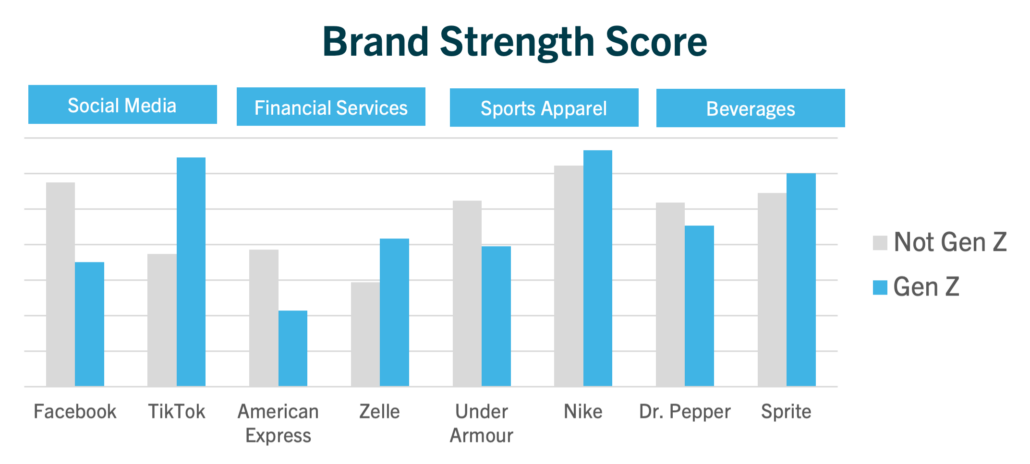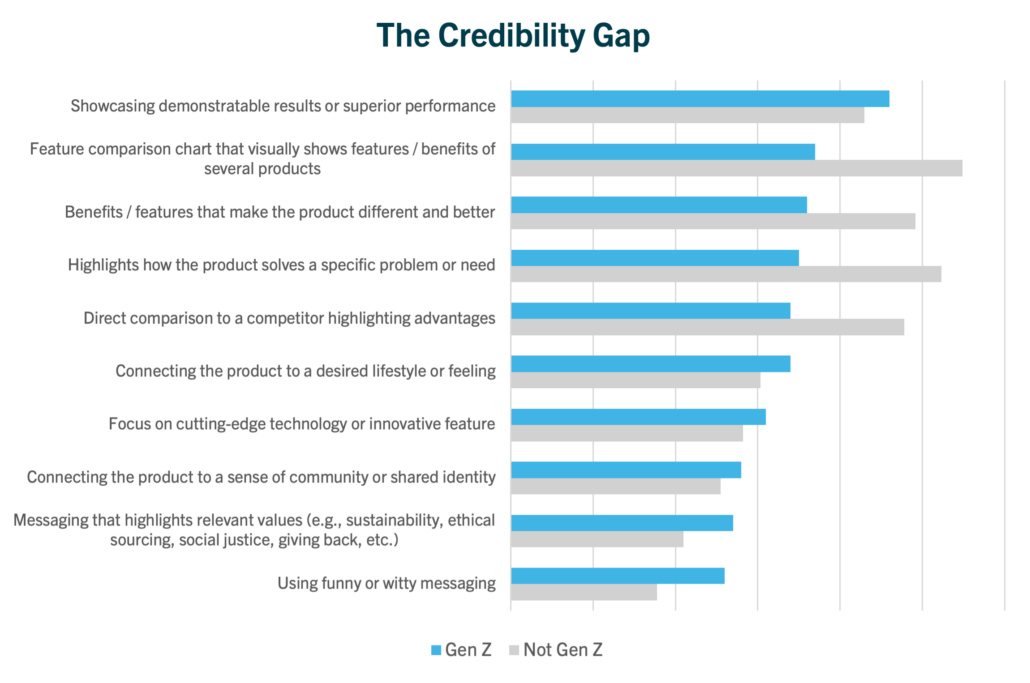
The Need for Innovation:
How Big Brands Can Better Resonate with Gen Z
by James Sorensen
Big brands are struggling to maintain relevance among Gen Z.
This younger generation, known for their digital fluency and selective trust, is increasingly turning away from established brands that fail to innovate and meet their unique needs. However, the key to capturing Gen Z’s attention lies not only in authentic communication, but in developing and launching innovative products that truly resonate with their core values and lifestyle.
Brands Struggle to Resonate with Gen Z
Many legacy brands are falling short with Gen Z. Burke’s research showed some larger brands – from Facebook to Dr. Pepper – measure significantly lower than with older generations when evaluated for brand strength. This gap remains consistent across a wide range of product categories where more innovative brands have taken the lead among Gen Z, and it underscores the need for companies to innovate and adapt to the preferences of Gen Z in order to bridge the relevance gap.

Source: Burke, Inc. (2022). Brand Strength R&D Survey.
Gen Z’s Demand for Authenticity and Practicality
Gen Z are information omnivores, consuming content across a wide range of sources. Not only do they consume information more readily, but they are also looking for new products and brands across a wider set of touchpoints. In our survey, we found that Gen Z learns about new products and brands from an average of 4.9 different info sources, while other generations range from an average of 2.6 (Boomers) to 4.0 (Millennials) on sources referenced. Gen Z, of course, is more apt to look for new products and brands on social media, but they are also more heavily influenced by friends and family – 31% of Gen Z say they learned about new products in the past week from friends and family (vs. 25% for Millennials).
However, Gen Z trust of information sources is selective. Given the impact of social media, we might expect influencers to be seen as trusted spokespeople, but Burke’s research shows that Gen Z are less likely to trust influencers than Millennials do (17% say influencers are believable vs. 25% of Millennials). Endorsement from friends and family is far-and-away the most believable among Gen Z (53% say friends and family endorsement is believable, on par with other generations). This, paired with Gen Z’s preference for user-generated, authentic content, highlights the need for brands to focus on genuine interactions and practical benefits to truly resonate.
Gen Z wants to be shown, not told
As digital natives, Gen Z craves hands-on experiences to see how things work, not just explanations. The top ways Gen Z wants to explore the benefits of a new product is through demonstration. They are less interested in commonly used tactics such as simple comparison charts, feature/benefit statements, or competitive claims. They are also more likely to be responsive to funny or witty messaging that highlights their personal values – further leaning into authenticity.

Source: Burke, Inc. (February, 2025). Burke Omnibus Survey.
Brands Successfully Engaging Gen Z
When it comes to Gen Z, newer brands can have a distinct advantage over more established ones. Emerging brands, such as TikTok and Zelle, have disrupted their categories in recent years and captured Gen Z’s attention with their innovative products and fresh experiences – resulting in comparatively stronger relevance scores. Alternatively, big, legacy brands have had to evolve with a mix of communication strategies as well as new product and experience innovation that focuses on authenticity and tangible benefits.
For example, Nike has maintained relevance among Gen Z by emphasizing credibility and innovation. Their campaigns often feature real athletes and everyday people, showcasing genuine stories and experiences. Additionally, their product innovations, such as the Nike Adapt self-lacing shoes, are truly unique and cater to Gen Z’s demand for practical and cutting-edge technology.
Sprite also keeps their core product line fresh by integrating new tastes (e.g., Lymonade) and limited time offers, while simultaneously building experiences around the brand that align with Gen Z’s cultural interests and values (e.g., hip-hop music, NBA). This blend of product newness and experiential relevance keeps Gen Z immersed and connected.
Now what?
To truly resonate with Gen Z, brands must go beyond authentic communication and focus on innovation in product development. This means creating products and experiences that offer clear, tangible benefits and demonstrable results— driven by innovative approaches.
By recognizing Gen Z’s distinct blend of practicality, selective trust, and digital fluency, brands can more effectively align their strategies to connect with this influential consumer group. Innovation, rather than mere communication, is the key to capturing the attention and loyalty of Gen Z.

James has been studying shoppers since 1993—first as part of the pioneering Sorensen Associates, the in-store research company, and then as part of the Kantar Retail Consulting practice. James now serves his clients as the retail and shopper insights expert at Burke.
Interested in reading more? Check out James’ other articles:
Recent ECommerce Growth May Not Last
Accelerating the Shopper Journey with GenAI
As always, you can follow Burke, Inc. on our LinkedIn, Twitter, Facebook and Instagram pages.
Source: Feature Image – ©Jacob Lund – stock.adobe.com








